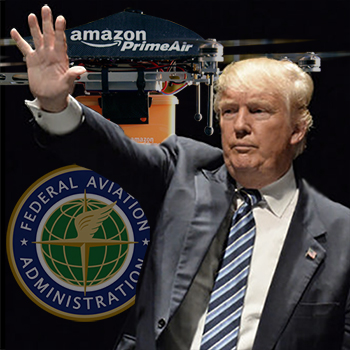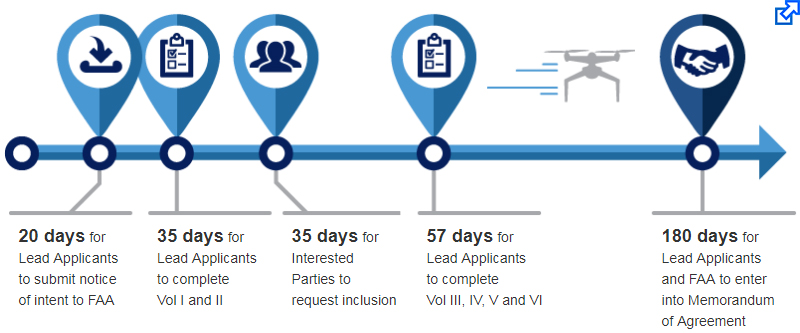President Donald Trump on Wednesday signed an executive order designed to speed the approval of drone flights over crowds and for longer distances.
The administration says it wants to open new commercial uses for the aircraft and create jobs.
“In order to maintain American leadership in this emerging industry here at home, our country needs a regulatory framework that encourages innovation while ensuring airspace safety,” Michael Kratsios, a deputy assistant to the president at the Office of Science and Technology Policy, said in a briefing with reporters.
Trump’s order, a response to calls from companies making and using drones, will allow local governments to apply to the Federal Aviation Administration for waivers allowing them to conduct tests of deliveries, drone air-traffic systems, long-range flights and other uses generally prohibited under current rules, Kratsios said.
The move is the latest attempt to jump-start an industry in which technology has moved at a rapid clip - only to be held back by regulatory and safety concerns.
The government adopted rules allowing routine commercial flights last year, but with rare exceptions, it limited operations to short distances and ordered that they are kept away from people.
“These partnerships will allow local communities to experiment with new technologies like package deliveries, emergency drone inspections, and more, on terms that work for them and in ways that support a unified and safe airspace,” Transportation Secretary Elaine Chao said at the kick-off event at the agency's headquarters.
Under the three-year program, localities are being encouraged to partner with the private sector to propose a wide range of drone operations, such as allowing package deliveries, and the FAA will determine whether to accept them into the pilot program on a case-by-case basis.
While U.S. companies have been among the industry’s leaders, some have complained that restrictive federal regulations have slowed their ability to move forward.
Companies including Amazon and Alphabet’s Project Wing have at times had to test their drone-delivery systems in other countries.
Key dates after publication of Federal Register Notice (FRN)
UAS Integration Pilot Program Resources
- Presidential Memo
Presidential direction to establish a pilot program to enable public/private partnerships to test and evaluate the integration of civil and public UAS operations into the National Airspace System. - Federal Register Notice
The official public announcement of the program. - Screening Information Request
Step-by-step instructions on how to submit an application, including what kind of information you need to provide when you need to provide it by, and in what format. - Sample Memorandum of Agreement
Related: Uber’s Next Transportation Disruption Flying Cars
Related White Papers
The Future Isn’t What It Used To Be
According to predictions made a few decades ago, current travel should involve self-driving automobiles, jetpacks and flying cars, with space transport a common occurrence. Download Now!
Parcel Delivery: The Future of Last Mile
Currently subject to significant disruption, last-mile delivery, especially of parcels, is getting a great deal of attention in the media and from investors, and rightfully so. Download Now!
Drone Technology: Clarity from Above
According PwC's study on the commercial applications of drone technology, the emerging global market for business services using drones is valued at over $127 billion. Download Now!
Fast-Forwarding to a Future of On-Demand Urban Air Transportation
This white paper delves into these challenges for achieving a successful VTOL transportation market, with an eye to surmounting them as quickly as possible, as well as our view on rider experience requirements. Download Now!
Article topics
Email Sign Up
























